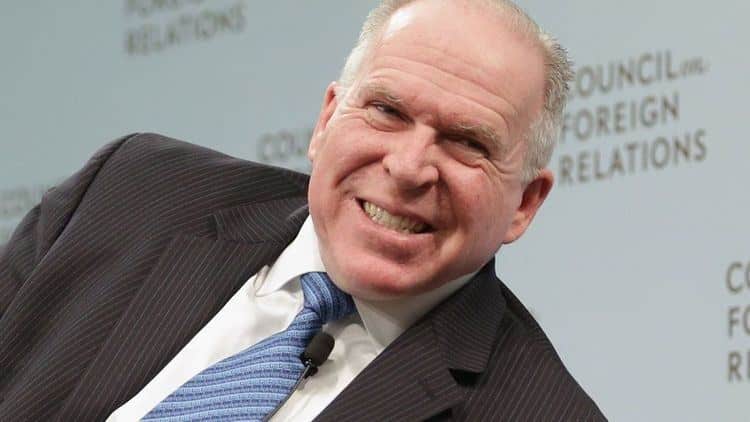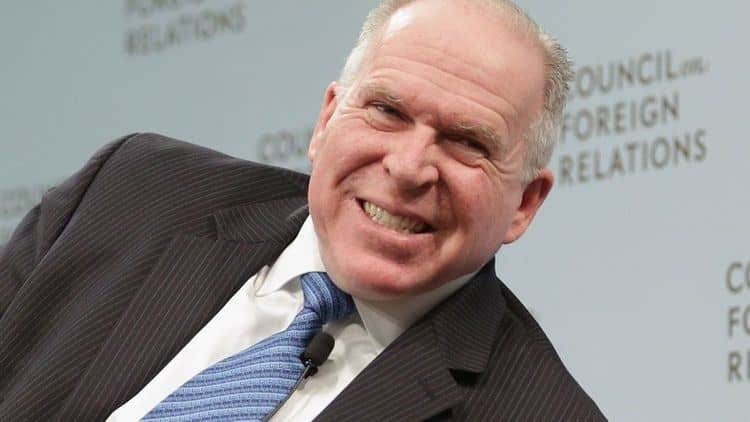“Thank God for the deep state,” declared former acting CIA chief John McLaughlin recently while appearing on a panel at George Mason University. A year ago, the deep state was routinely reviled as a figment of paranoid right-wingers’ imagination. But much of the news media are now conferring the same sainthood on the deep state that was previously bestowed on special counsel Robert Mueller.
A New York Times article last month gushed that “over the last three weeks, the deep state has emerged from the shadows in the form of real live government officials, past and present … and provided evidence that largely backs up the still-anonymous whistleblower” on President Donald Trump’s phone call to the president of Ukraine. Times columnist James Stewart declared: “There is a deep state, there is a bureaucracy in our country who has pledged to respect the Constitution, respect the rule of law … protecting the American people.” Times editorial writer Michelle Cottle proclaimed that “the deep state is alive and well” and hailed it as “a collection of patriotic public servants.”
Intelligence agencies gone rogue
Former CIA Director John Brennan, appearing on the same panel as McLaughlin, declared, “The reason why Mr. Trump has this very contentious relationship with CIA and FBI and the deep state people … is because they tell the truth.”
Much of the news coverage of the Trump impeachment is following that storyline — even though it is astonishing as an overheated Trump tweet.
Five years ago, Brennan’s CIA ignited what should have been a constitutional crisis when it was caught illegally spying upon the Senate Intelligence Committee, which was compiling a massive report on the CIA torture program. After 9/11, the CIA constructed an interrogation regime by “consulting Egyptian and Saudi intelligence officials and copying Soviet interrogation methods,” The Times reported in 2007. Secret Bush administration torture memos “set the CIA loose to slam suspects’ heads into walls up to 30 times in a row, to deprive suspects of sleep for more than a week straight, to confine them to small dark boxes for hours at a time … and to suffocate them with water to induce the perception that they are drowning,” Georgetown University law professor David Cole noted. But the only official who went to prison was John Kiriakou, a former CIA operative who publicly admitted that the CIA was waterboarding.
Is the deep state more trustworthy when it is killing than when it is torturing?
Brennan declared in 2016 that “the president requires near certainty of no collateral damage” before approving a drone strike. Confidential CIA documents revealed that the CIA had little or no idea who it was killing most of the time with its drone attacks in Pakistan, Somalia, Afghanistan, Yemen and other nations. A Salon analysis, summarizing an NBC News report, noted, “Even while admitting that the identities of many killed by drones were not known, the CIA documents asserted that all those dead were enemy combatants. The logic is twisted: If we kill you, then you were an enemy combatant.” Lying about drone killings quickly became institutionalized throughout the deep state. The Times reported in 2015: “Every independent investigation of the (drone) strikes has found far more civilian casualties than administration officials admit.”
The deep state is practically designed to destroy privacy that enable government officials to deny illegalities. The National Security Agency’s credibility was obliterated in 2013 when former NSA analyst Edward Snowden revealed that the agency can tap almost any cellphone in the world, access anyone’s email and web-browsing history, and crack the vast majority of computer encryption. But the NSA’s definition of “terrorist suspect” was ludicrously broad, including “someone searching the web for suspicious stuff.” A few months before Snowden’s revelations, national intelligence director James Clapper lied to Congress when he denied that the NSA collects “any type of data at all on millions, or hundreds of millions of Americans.”
Cover-ups at the Pentagon
Trump’s version of his call to the Ukraine president has been challenged in closed testimony to the House Intelligence Committee by Army Lt. Col. Alexander Vindman, the Ukrainian-born officer who listened in to the call while serving on the National Security Council.
There are plenty of honorable, upright military officers, but the Pentagon per se has as much credibility as a second-term congressman. In the post 9/11 era, Pentagon officials deluged the news media with false progress claims on wars in Afghanistan and Iraq, perennially covered up killings of civilians, and also sought to bury their own torture scandal (revealed in a neglected 2008 report by a Senate investigation co-chaired by John McCain).
The deep state has an appalling record of abusing the whistleblowers who are now being acclaimed. A draft Intelligence Community Inspector General report last year found that intelligence agencies refused to recognize retaliation against whistleblowers in 99% of cases, according to The Daily Beast. A 2017 report by Foreign Policy magazine concluded that “the intelligence community’s central watchdog is in danger of crumbling thanks to mismanagement, bureaucratic battles, clashes among big personalities, and sidelining of whistleblower outreach and training efforts.” After CIA Inspector General John Helgerson compiled a damning report on the CIA’s post 9/11 interrogation program, CIA chief Michael Hayden launched a major investigation of Helgerson in 2007, provoking outrage on Capitol Hill. (The CIA managed to delay the release of Helgerson’s report for years, thereby keeping both Congress and the American people in the dark regarding shocking abuses.)
It is worse than naive to expect the deep state to provide an antidote to the venality of American politics. The agencies now being exalted have some of the longest records of deceit and crimes. The secrecy that has shrouded US intelligence, surveillance and military operations has done nothing to make former Boy Scouts and church choir members ascend to key policymaking positions.
The Trump-deep state clash is a showdown between a presidency that has become far too powerful versus federal agencies that have become fiefdoms that enjoy immunity for almost any and all abuses. Regardless of the outcome of the congressional impeachment investigation, can the political system pull in the reins on imperious agencies? It is unlikely.
James Bovard, author of “Attention Deficit Democracy,” is a member of USA TODAY’s Board of Contributors. Follow him on Twitter: @JimBovard
Reprinted with author’s permission from USAToday.


